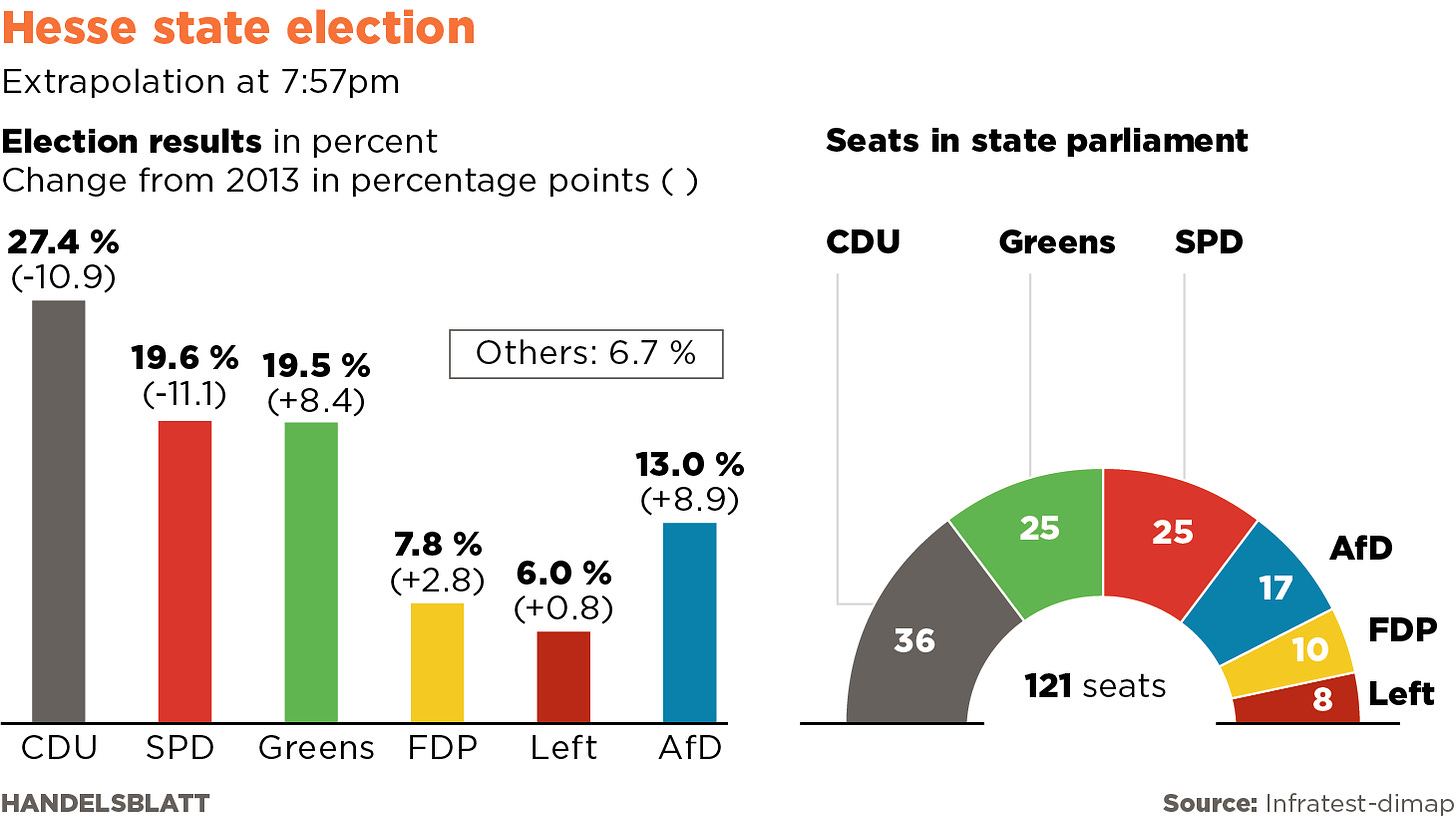Merkel will leave a vacuum that nationalism will fill
What to make of the Hesse election
I have a wide assortment of political economy stories to present today. I can't pack them all into one newsletter. So I am going to break out a few into separate posts.
I want to start with the news out of Germany that Angela Merkel will not run for another term in office, either within her party or as Chancellor. The reason: her party took another shellacking at the polls in the state elections in Hesse at the weekend. The CDU remained the largest party in Hesse. But its vote share nosedived to 27%, its worst showing in half a century. That's down from 38% in the last state election just five years ago.
Before getting into the specifics, note the following: as I indicated last week, before the election, the right-wing AfD party was expected to get enough votes to enter the state chamber, making them a force to reckon with in all 16 German state parliaments for the first time ever. The AfD and, even more so, the Greens were the big winners.
I don't think this election or the one in Bavaria was a referendum on Merkel which the AfD won. They simply didn't surge enough or get enough votes to make that conclusion. Moreover, the Green Party was the big winner. Nevertheless, the crumbling of Merkel's party has forced her into retreat. And when she does retreat, that will leave the door open for right wing nationalists' agenda, both in Germany and in Europe as a whole.
The old parties crumble
Two weeks ago, after the Bavarian vote, I wrote about Angela Merkel's Bavarian sister party, saying: "The CSU’s members are dying. Put simply, the CSU is a party of old people. The CSU is dying. That’s not true just for the CSU, but also the other mainline center party, the SPD." And of course, it's true for Merkel's CDU as well. And Merkel doesn't help here. After all, she has been CDU chairwoman since 2000. That's too long, frankly.
This is what Hesse's tally looked like:

The CDU will cling to power in Hesse, only just. However, you can see the big gains for the Greens and the AfD and the big losses for the CDU and the SPD. In fact, I have been saying the Green Party is now the standard bearer for the center left, replacing the social democrats of the SPD. The AfD has gained even more than the Greens, yes. But, as a party they are still very much a third party, and are not a rival to the CDU on the center-right or the right.
So, think of the Hesse election as confirming the loss of support for the two aging center parties. The CDU hangs on with the AfD not able to effectively counter them, particularly in western Germany. But, on the left, the SPD are seen to have abandoned their working class base. And they have now been overrun by the Greens.
What does this mean for the Grand Coalition?
Angela Merkel's immediate reaction that she will not stand again says it all. She knows that she hurt the state party because the election turned into a referendum on the Grand Coalition in Berlin. She was going around Hesse in the run-up to the election asking voters to vote on local issues and to forget about Berlin. That's telling. But that strategy didn't work. And she has taken responsibility.
There is no obvious replacement for Merkel in the CDU though. And so the jockeying for position to replace Merkel as party chair will begin - with an eye toward the next election. And that's negative for stability in Germany. It's negative for Merkel's government coalition with the CSU and the SPD. In fact, at this point, there's no guarantee the coalition will survive until 2021 when the next election is slated and Merkel's party successor would run.
That leaves a vacuum in German politics. The Green Party could fill it. The liberertarian-minded FDP could do as well. But the AfD could fill the vacuum. And I tip them to gain in popularity.
In Europe, no one can replace Merkel
Despite the fact that Merkel has another three years to lead, she has, in effect, made herself a lame duck. Everyone knows her time is limited now. So, on the European and international level, Merkel's sway is now limited. I doubt that she can have the same ability to dominate issues in Europe as she did with the Greek sovereign debt crisis or the refugee crisis.
And, among establishment parties, there's no one who can take over that role. The UK is leaving the EU. Macron is deeply unpopular in France. And Italy is run by eurosceptical populists. So, here too, nationalists and eurosceptics will benefit from Merkel's weakness. And that will also mean that Europe will be a poor counterbalance to Donald Trump on trade and on nationalism.
Final thoughts
I know the Green Party was the big winner yesterday in Germany. Nevertheless, for me, the dominant theme of the election in Hesse and Merkel's reaction to it is not about the Greens. Instead, I see Merkel, as the dominant European political figure, creating a power vacuum domestically, in Europe, and internationally.
And, given the current state of politics in Europe, that vacuum is unlikely to be filled by a similarly centrist figure. There no one available. Instead, Europe will become relatively rudderless, with the likes of Jean-Claude Juncker as the key statesmen. That's a void that nationalism will most certainly fill.
